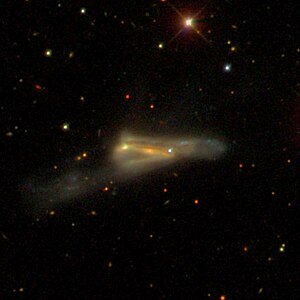This is an old revision of this page, as edited by EighteenFiftyNine (talk | contribs) at 05:09, 29 September 2018 (Changed “had” to “is”). The present address (URL) is a permanent link to this revision, which may differ significantly from the current revision.
Revision as of 05:09, 29 September 2018 by EighteenFiftyNine (talk | contribs) (Changed “had” to “is”)(diff) ← Previous revision | Latest revision (diff) | Newer revision → (diff)| NGC 523 | |
|---|---|
 NGC 523 as seen on SDSS NGC 523 as seen on SDSS | |
| Observation data (J2000 epoch) | |
| Constellation | Andromeda |
| Right ascension | 01 23.3 00 |
| Declination | +34° 02′ 00″ |
| Redshift | 0.0159 |
| Heliocentric radial velocity | 4758 +/- 4 km/s |
| Galactocentric velocity | 4904 +/- 7 km/s |
| Distance | 219 million light years away |
| Apparent magnitude (V) | 12.7 |
| Apparent magnitude (B) | 13.5 |
| Characteristics | |
| Type | SBc/P |
| Apparent size (V) | 2.5 feet x 42 inches |
| Other designations | |
| NGC 537, 4ZW 45, Arp 158, CGCG 521-22, IRAS 01225+3345, MCG 6-4-18, PGC 5268, UGC 979, V V 783 | |
NGC 523, also known as NGC 537, 4ZW 45, Arp 158, CGCG 521-22, IRAS 01225+3345, MCG 6-4-18, PGC 5268, UGC 979, and V V 783, is a spiral galaxy located in the constellation Andromeda. It was discovered separately by William Herschel on September 13, 1784, and by Heinrich d'Arrest on August 13, 1862. d'Arrest's discovery was listed as NGC 523, while Herschel's was listed as NGC 537; the two are one and the same. John Dreyer noted in the New General Catalogue that NGC 523 is a double nebula.
See also
External links
- NGC 523 on WikiSky: DSS2, SDSS, GALEX, IRAS, Hydrogen α, X-Ray, Astrophoto, Sky Map, Articles and images
- SEDS
References
- ^ Frommert, Hartmut. "NGC 523". spider.seds.org.
- ^ Rojas, Sebastián García. "Galaxy NGC 523 · Deep Sky Objects Browser". DSO Browser.
- ^ "Your NED Search Results". ned.ipac.caltech.edu.
- "New General Catalog Objects: NGC 500 - 549". cseligman.com.
| Astronomical catalogs | |
|---|---|
| NGC | |
| PGC | |
| UGC | |
This galaxy-related article is a stub. You can help Misplaced Pages by expanding it. |